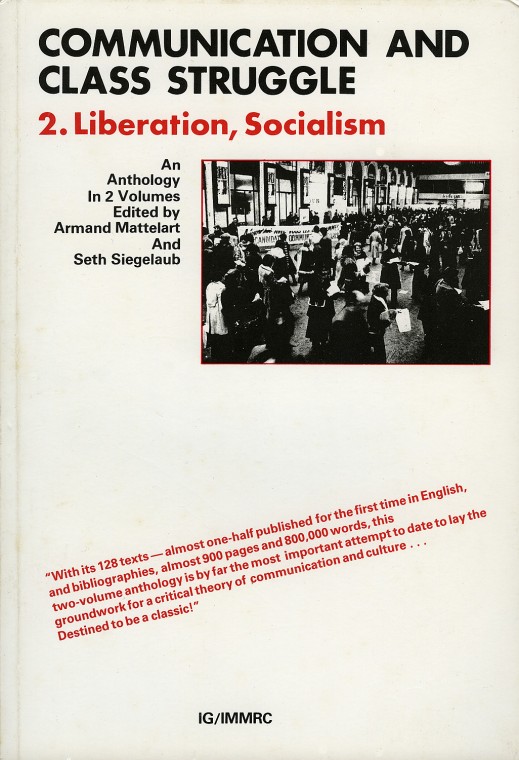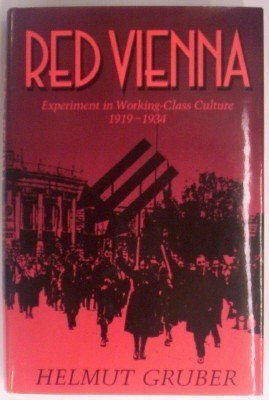Armand Mattelart, Seth Siegelaub (eds.): Communication and Class Struggle, 2: Liberation, Socialism (1983)
Filed under book | Tags: · aesthetics, communication, communism, everyday, information, left, life, machine, marxism, mass media, media, political economy, politics, socialism, theory

“Communication and Class Struggle, a two-volume work, is the first general marxist anthology of writings on communication, information and culture. Its purpose is to analyse the relationship between the practice and theory of communication and their development with the context of class struggle. Armand Mattelart and Seth Siegelaub, the editors, have selected more 128 essential marxist and progressive texts originating in over 50 countries and written since the mid-nineteenth century to explain three interrelated phenomena: (1) how basic social, economic and cultural processes condition communication; (2) how bourgeois communication practice and theory have developed as part of the capitalistic mode of production; and (3) how in the struggle against exploitation and oppression, the popular and working classes have developed their own communication practice and theory, liberated mode of communication, culture and daily life.
The second volume provides an analysis of the development of popular and working-class communication and culture, its theory and practice under different political-social and historical conditions, and its contemporary expression. The book contains 64 texts. 38 are published for the first time in English, and some texts appear for the first time in any language. In addition, it includes a 650-entry bibliography.” (from the back cover)
Publisher International General, New York, and International Mass Media Research Center (IMMRC), Bagnolet, 1983
ISBN 0884770192, 9780884770190
438 pages
Review: Dallas W. Smythe (Journal of Communication 1985, p 218ff).
PDF (40 MB, updated to OCR’d version on 2017-10-30 via Memory of the World)
See also Volume 1.
Helmut Gruber: Red Vienna: Experiment in Working-Class Culture, 1919-1934 (1991)
Filed under book | Tags: · 1920s, 1930s, austria, city, communism, labour, marxism, politics, socialism, urbanism, vienna

“From 1919 to 1934, the Socialist government in Vienna sought to create a comprehensive working-class culture, striving to provide a foretaste of the socialist utopia in the present. In Red Vienna, Gruber critically examines the impact of this experiment in all areas of life, from massive public housing projects and health and education programs to socialist parades, festivals, and sporting events designed to create a ‘new’ working class.”
Publisher Oxford University Press, 1991
ISBN 0195069145, 9780195069143
x+270 pages
Reviews: Mark Emanuel Blum (Central European History, 1992), George V. Strong (History of European Ideas, 1993), William D. Bowman (Journal of Social History, 1993), Alfred Diamant (American Historical Review, 1993), J. Robert Wegs (Austrian History Yearbook, 1993), Karen J. Vogel (American Political Science Review, 1993), Albert Lindemann (International Labor and Working-Class History, 1993).
PDF (12 MB, updated on 2021-4-22, via Libcom.org)
PDF (6 MB, added on 2021-4-22, via ZLibrary)
See also Eve Blau’s The Architecture of Red Vienna, 1919-1934, MIT Press, 2000 (PDF, 18 MB)
Comment (0)Ruth First (1997/2012)
Filed under book | Tags: · activism, africa, apartheid, biography, communism, democracy, journalism, politics, race, south africa

“The struggle to free South Africa from its apartheid shackles was long and complex. One of the many ways in which the apartheid regime maintained its stranglehold in South Africa was through controlling the freedom of speech and the flow of information, in an effort to silence the voices of those who opposed it. United by the ideals of freedom and equality, but also nuanced by a wide variety of persuasions, the ‘voices of liberation’ were many: African nationalists, communists, trade-unionists, pan-Africanists, English liberals, human rights activists, Christians, Hindus, Muslims and Jews, to name but a few.
The Voices of Liberation series ensures that the debates and values that shaped the liberation movement are not lost. The series offers a unique combination of biographical information with selections from original speeches and writings in each volume. By providing access to the thoughts and writings of some of the many men and women who fought for the dismantling of apartheid, this series invites the contemporary reader to engage directly with the rich history of the struggle for democracy.
This volume presents a brief biography of Ruth First, followed by a selection of her writings as a political activist, scholar and journalist. The book presents a timeline summary of significant events in Ruth’s life within the context of major socio-political events of the time. It concludes with a reflection on her legacy from a current perspective and offers a further reading list.”
Compiled by Don Pinnock
Publisher HSRC Press, Cape Town, 1997
Second edition, 2012
Voices of Liberation series, 2
Open access
ISBN 9780796923592
vii+182 pages
Commentary: Ruth First: lessons for a new generation of African scholars (Tebello Letsekha, DEP, 2014).
Ruth First Papers
PDF chapters (bibliography missing)
single PDF (complete)

